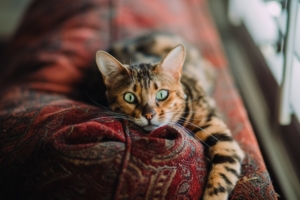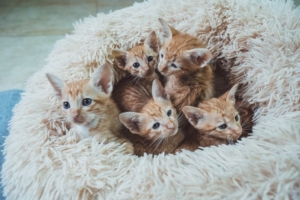Cat Vaccinations 101
August is Immunization Awareness Month! Most, but not all pet owners believe that vaccinating your pet is essential to their health. Some pet owners consider vaccination unnecessary. Others agree that the core shots are crucial but ignore the need for boosters. The following information can help you make sound decisions about vaccinating your cat and which vaccines your vet considers essential.

Photo by Caleb Woods on Unsplash
Why you should vaccinate
- Vaccination is one way to show that you love your cat and want the best for her. Failing to vaccinate puts her at risk of contracting dangerous infectious diseases. They could threaten her life and even potentially harm you.
- Vets recommend it. There are many rumors about pet vaccines. Your rule of thumb should be: if it is not from a qualified expert, dump it. Animal health experts from the American Association of Feline Practitioners and the American Animal Hospital Association affirm that vaccinations are necessary for your pet.
- Vaccinating your pet is the law. Although the details of animal laws may differ from state to state, all states have statutes compelling pet owners to vaccinate their pets. Failure to vaccinate your cat could land you in trouble with the authorities.
When should you vaccinate your cat?
Newborn kittens depend on their mother for nourishment, warmth, security, and good health. Mummy cat’s milk contains colostrum – a complex compound that builds immunity in the kitten’s body. However, each kitten responds differently to the colostrum. Some quickly develop a robust immune system, while others remain weak and vulnerable to diseases for weeks.
To reduce the uncertainty, the American Association of Feline Practitioners recommends that kittens start getting vaccinations when they are 6 to 8 weeks old. The shots should continue until they are about 16 weeks old. Cats older than 16 weeks should receive booster shots as recommended by the vet.

Photo by Kym Ellis on Unsplash
What vaccines should your cat receive?
According to guidelines provided by the American Association of Feline Practitioners, there are two categories of cat vaccines:
- Core vaccines
- Non-core vaccines
Core vaccines are mandatory and often a legal requirement. Non-core vaccines, on the other hand, are not a necessity. They are administered depending on the circumstances of the cat. These may include:
- Age – The vet could recommend certain non-core shots to help a kitten build immunity while young.
- Geographic location – Some diseases are more prevalent in specific locations. For example, Lyme disease is common in heavily wooded areas.
- Lifestyle – A cat that often interacts with the outside world, other pets, and different environments has a higher risk of contracting infectious diseases. It may require several non-core shots and boosters. However, an indoor cat that lies in bed all day has little or no exposure. It is at a lower risk and may require fewer shots.
Core vaccinations
Rabies shot: This protects against rabies, a dangerous infectious disease that affects both animals and humans. According to the CDC, cases of rabies in cats have been on a downward trend. However, different state laws require rabies shots for all cats. The vaccine is given as a single shot when the kitten is between 8 and 12 weeks old. The cat will take a booster shot one year later.
FPV Shot – Protects against feline panleukopenia or feline parvovirus. It is a highly infectious disease that often affects kittens. It attacks the immune system and is often fatal. The kitten gets the initial vaccine as early as six weeks and subsequent shots every 3-4 weeks until the kitten is 16 weeks old.
FHV1 Shot – Protects against feline herpesvirus and feline rhinotracheitis virus disease. The virus causes severe upper respiratory infection, oral ulceration, and pneumonia. Like the FPV shot, the kitten gets the FHV1 shot as early as six weeks old. Subsequent jabs come every 3-4 weeks until the kitten is 16 weeks old.
FCV Shot – This is a combined shot that protects against several viruses that cause upper respiratory infections. The FCV shot is also given as early as six weeks. Boosters come every 3-4 weeks until the kitten is 16 weeks old.
Non-core vaccinations
Your vet will advise which of these non-core vaccinations are suitable for your kitty:
- Feline Leukemia Virus (FeLV) vaccine – Given when the kitty is 8-12 weeks old
- Feline Immunodeficiency Virus (FIV) – Given when the cat is eight weeks old
- Feline Infectious Peritonitis (FIP) – Given when the cat is 16 weeks of age
- Chlamydophila felis – Given when the kitten is nine weeks old
- Bordetella bronchiseptica – Given when the cat is eight weeks old
A final word on cat vaccinations
The benefits of vaccinating far outweigh the negatives. Talk to your veterinarian if you have any concerns about specific vaccines. A disease-free cat is healthier and happier.
Guest Author-
Emila is a freelance journalist and blogger with a love for those with four legs! She has grown up around animals and pets and wants to use her knowledge on pet behavior, training and lifestyle tips to help other pet parents live the best possible life with their furry friend.
